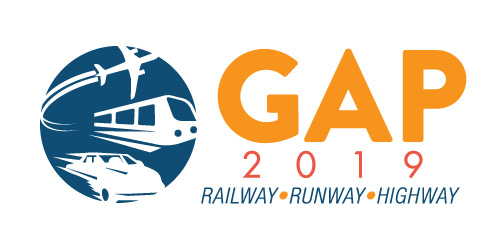The growing field of transportation geotechnics will be the focus of the inaugural Geo-Structural Aspects of Pavements, Airfields, and Railways Conference (GAP 2019). The event, managed by Minerva (publisher of Geosynthetica), is being developed in partnership with the Federal Highway Administration, Federal Aviation Administration, Federal Railroad Administration, and the U.S. Army Engineer Research and Development Center, will be held 4 – 7 November 2019 in Colorado Springs, Colorado.
The abstracts acceptance window has been extended to February 15, following multiple requests from TRB attendees. The Organizing Committee invites abstracts for full papers and live presentation-only contributions. Full papers will be published in the peer-reviewed proceedings. Submit your abstract of 200 – 400 words online.

This unique event brings the major transportation disciplines out of their silos and into an inter-disciplinary dialogue between agencies and private sector engineering and construction specialists. The result is identification of redundancies in research, re-evaluation of how geotechnical problems are defined and resolved, and advancements in the state of practice for transportation geotechnics.
GAP 2019 will also offer a field trip to the renowned Transportation Technology Center near Pueblo. Two young geotechnical engineers sessions are also being developed.
Visit the GAP 2019 website and sign up for communications from the event
Exhibit and sponsorship sales will open in February.
GAP 2019 ABSTRACTS CALL: MAJOR TOPICS
The main objectives of GAP 2019 are to:
- Foster communication between the main transportation sectors (Road, Rail, Air)
- Generate cooperation between the pavement and geotechnical disciplines
- Advance pavement and embankment engineering technologies
“This event will be an invaluable opportunity to develop better technical exchange of solutions to shared issues in our aging transportation infrastructure,” the organizing committee writes. “A special emphasis will be placed on including technical sessions, panel discussions, and short courses that encourage contribution and learning for the participants from three modes of transportation.”
Some of the topics the organizers invite paper and presentation abstracts on include, but are not limited to:
Asset Management
- Pavement and Embankment Asset/Risk Management Concepts and Methodologies
- Cost Analysis Systems for Pavements, Railways, and Airfields
- Quality Assurance: How to Create Systems to Train and Ensure Effectiveness for Inspection and Assessment and What to Do with the Data
Monitoring and Condition Assessment
- Design Life Cycles vs System Degradation: An Ongoing Functional Assessment
- Reactive vs Proactive Asset Management: Case studies
- Condition Assessment: Methodologies and Technologies for Pavements, Airfields, and Railways
- UAVs – Effective Use, Regulations, and Restrictions
Design and Construction
- Performance and Material Specifications for the Design and Construction of Contaminated Bases; Working with What We Have
- Reclaimed Materials – Methods for Use, Environmental Impact and Costs
- Sustainable Design Concepts with Limited Aggregate Resources.
- Designing Unbound Layers to Optimize Strength and Drainage Properties
- Improving the Mechanical Properties of Structural Aggregates with Nanoparticles
- Design Strategies for Maintenance
- Constructability and Design Considerations from Subgrade to Pavements
Tech Transfer, Communication and Data Management
- Quality Assurance: Training Methodologies to Ensure Effective Inspection and Assessment
- Development and Use of e-Construction for Construction and Inspection
GAP 2019 abstracts are open to the broad range of materials, technologies, and services that influence the geostructural designs and choices we make in roadways, railways, and airfields.
Learn more about the conference, sign up for the event newsletter, and contribute to the GAP 2019 Abstracts Call at www.gap2019.com.











